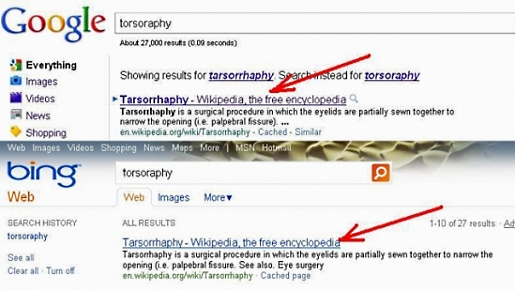
It’s hard for a start-up search engine to get traction. When Microsoft started developing Bing, the nascent search engine has been working hard to gather up information, improve its search results, and build a better search engine. However, did Bing do this fairly? According to Search Engine Land, Microsoft Bing has been copying Google search engine results. Google, having investigated this, agrees with Search Engine Land’s results, having inserted so-called honeypot searches (planting sites at the top of weird phrase searches) into their results and seeing if they appeared in Bing. While these honeypots showed up in Bing queries, Microsoft denies the fact that they directly copy Google’s search results, but they do admit that some of Google’s search data is collected and “user preferences” are used in Bing search rankings, there’s no direct copying. Gentlemen, start your blogs!
Google Fellow Amit Singhal has responded via Google’s official blog in a very strongly-written statement, full of pictorial evidence and explanations of just how Google conducted its Bing sting:
At Google we strongly believe in innovation and are proud of our search quality. We’ve invested thousands of person-years into developing our search algorithms because we want our users to get the right answer every time they search, and that’s not easy. We look forward to competing with genuinely new search algorithms out there—algorithms built on core innovation, and not on recycled search results from a competitor. So to all the users out there looking for the most authentic, relevant search results, we encourage you to come directly to Google. And to those who have asked what we want out of all this, the answer is simple: we’d like for this practice to stop.
Meanwhile, Bing Corporate Vice President Harry Shum is also blogging about the situation at the Bing Community:
We use over 1,000 different signals and features in our ranking algorithm. A small piece of that is clickstream data we get from some of our customers, who opt-in to sharing anonymous data as they navigate the web in order to help us improve the experience for all users. To be clear, we learn from all of our customers. What we saw in today’s story was a spy-novelesque stunt to generate extreme outliers in tail query ranking. It was a creative tactic by a competitor, and we’ll take it as a back-handed compliment. But it doesn’t accurately portray how we use opt-in customer data as one of many inputs to help improve our user experience.
Is Bing really stealing Google’s search results? Well, Bing may be copying some of Google’s search results, like they’re being accused of, but calling it stealing is a bit strong. When you’re dealing with publicly-available information and things collected legally via the Bing toolbar and Microsoft Internet Explorer 8, is it really stealing? Surely Google thinks so, hence their strong response via their blog.
Image: Fox News
Tags: search engines, Bing stealing Google search results, search engine results copied from Google to Bing, Google versus Bing, search engine war, Bing accused of stealing Google search results, search engine algorithm, search engine copying, search engine copying, Amit Singhal, Harry Shum, Microsoft vs. Bing







